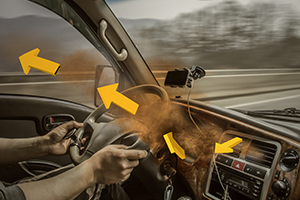MAKE HEALTH & SAFETY A PRIORITY WITH PROPER CABIN AIR FILTRATION
By Zafar Hussain, Senior Product Engineer at Luber-finer
It may not always seem like it – especially on a bright, sunny day on the open road – but the occupants of a heavy-duty vehicle’s cabin are under constant assault from allergens, pollutants and other airborne contaminants.
A cabin air filter is a front line of defense against these contaminants before they enter the cabin, where inhaling them can lead to a range of health problems for the driver and passengers, including:
Allergic reactions
- Irritated mucous membranes
- Watery or irritated eyes
- Headaches
- Nausea
- Asthma
These problems can be magnified when traveling in the cabin of a vehicle that does not have proper air circulation or appropriate filtration for the predominant operating conditions.
The Air We Breathe
To stress the importance of those things, consider that the air inside a vehicle can often be more polluted than the air outside. This is due to contaminants such as mold spores, bacteria, pollen, diesel soot, dirt, dust, exhaust gases and smog entering a vehicle’s passenger compartment through the air conditioning, heating and ventilation systems.
When these systems draw in outside air and the windows are closed, contaminants become concentrated inside the passenger cabin. Micro-organisms can then begin to accumulate, potentially multiplying to concentrations of between 5-8 times higher than normal. A poorly ventilated cabin can also become covered in a fine layer of dust as contaminants settle on all the surfaces. This allows the contaminants to remain in the cabin even longer.
If that many contaminants can exist inside the cabin, imagine how many more the cabin air filter captures. Most drivers and passengers would be surprised to see the dirt, dust, and debris that accumulates over even a short amount of time, let alone the allergens that can pass through the ventilation system when cabin air filtration is insufficient.
Putting Safety First
Those who stress the importance of maintaining safe working conditions should also understand how clean cabin air contributes to driver safety.
Breathing cleaner air and having a properly functioning ventilation system at their disposal may help drivers stay more alert so they can finish their routes without incident. Cleaner cabin air can also help a driver avoid sneezing, blurry vision, headaches and other distractions associated with allergy symptoms resulting from pollen and other contaminants entering the cabin compartment. Some think there are fewer allergens in the air as colder temperatures arrive, but there are plenty of perennial allergens to deal with year-round. Ragweed pollen and mold spores in particular are at elevated levels from late summer to mid-fall.
Speaking of colder temperatures, clean cabin air filters also reduce difficulty with de-icing and fogging up of windows, which can inhibit visibility and cause hazardous driving conditions.
Keep It Clean
How do you know your cabin air filter needs attention? When it becomes excessively dirty, it can cause a couple of noticeable symptoms:
- Poor air flow – Vents will blow with noticeably less force, reducing the overall cooling capacity of the A/C system and also placing an additional strain on the A/C blower motor.
- Unusual odor – A dusty, dirty, or musty smell will come from the vents when the air is turned on, and may make the cabin uncomfortable for the driver and passengers.
To alleviate these issues and create the safest, most pleasant environment possible for hard-working drivers, Luber-finer offers the Extreme Clean HD™ Premium Cabin Air Filter. This dual-action filter can remove up to 98% of bacteria, dust, pollen and other allergens (of 5 to 100 microns) from incoming air. Activated carbon and baking soda in the media work together to remove volatile organic compounds, such as hydrocarbons and gas emissions, as well as a wide range of nuisance odors. The result is the purest, most odor-free air you can get in a cabin.
Make the Change
Like other filters on a vehicle, cabin air filters need to be changed at routine intervals to help maintain healthy cabin air quality. At minimum, you should clean and freshen your cabin air with a new cabin air filter every 12,000 to 15,000 miles. Seasonal replacement to protect against pollutants created during different times of the year is recommended for vehicles that regularly experience harsh temperatures or severe climate changes.
Installing a cabin air filter is not a complicated process and should not prevent regular maintenance. In most trucks, the cabin air filter is located under the hood at the outside air intake along the firewall on the passenger side. This is where outside air goes through the filter before it comes into the cabin. The filter’s housing is easy to access and often is clearly marked. In most cases a service technician can perform a cabin air filter replacement in 15-30 minutes.
To learn more about the importance of cabin air filters, enroll in Luber-finer University, an interactive online experience that educates users about all types of heavy-duty filtration. And remember that investing in a quality cabin air filter is the easiest way to improve the quality of a driver’s home away from home.
Zafar Hussain
Zafar is a Senior Product Engineer at Luber-finer, one of the world’s most trusted filter brands. He has worked in the filtration industry since 2002 and has multiple patents under his name, including Luber-finer’s Heavy-Duty Time Release Technology (TRT™) Oil Filter.


Have your say
This is a moderated forum. Comments will no longer be published unless they are accompanied by a first and last name and a verifiable email address. (Today's Trucking will not publish or share the email address.) Profane language and content deemed to be libelous, racist, or threatening in nature will not be published under any circumstances.